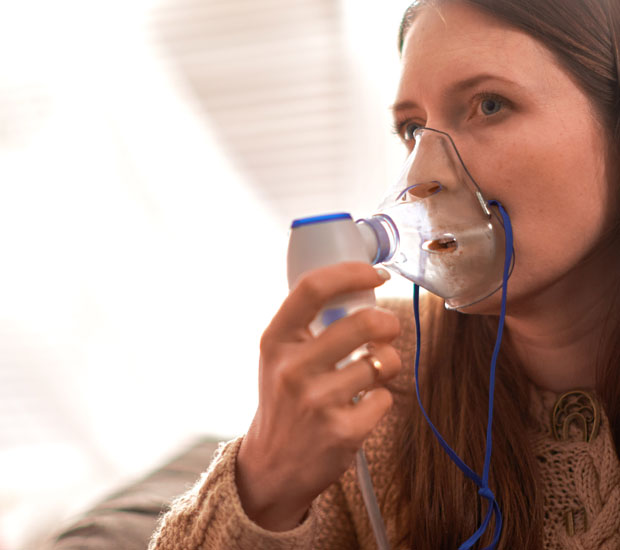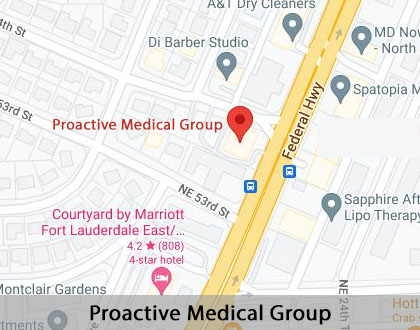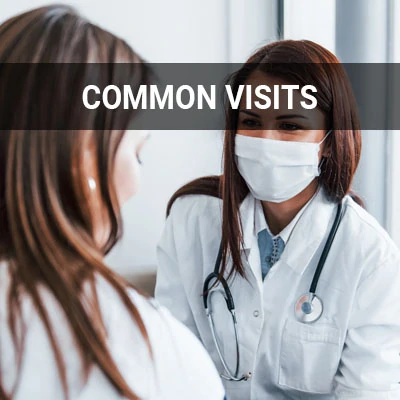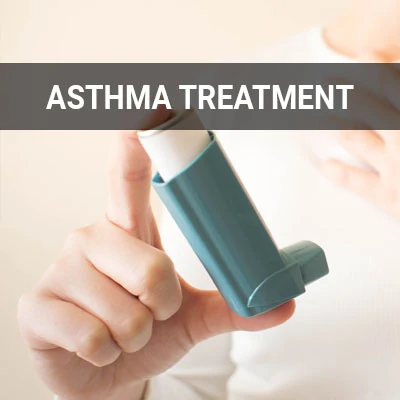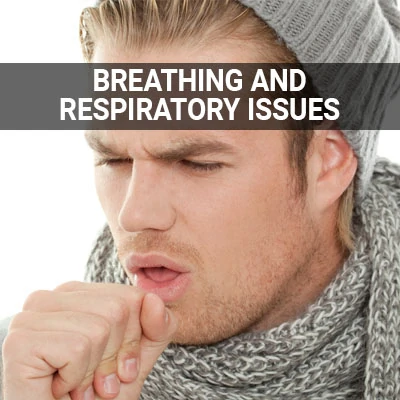Respiratory Illness Treatment Fort Lauderdale, FL
Respiratory illnesses, such as bronchitis and pneumonia, tend to present similar symptoms to one another. However, different types of respiratory illnesses require different types of treatment. A primary care physician understands the small differences between various respiratory illnesses and how to treat them accordingly.
Treatment for respiratory illness is available at Proactive Medical Group in Fort Lauderdale and the surrounding area. Symptoms of respiratory illness can often be concerning. Call us today at (954) 938-2843 to schedule an appointment or to learn more about our services.
Understanding Respiratory Illness
Respiratory illnesses refer to any condition that develops due to damage and exposure to the lungs and other parts of the respiratory system. There are several types of respiratory illness. Two of the most popular are bronchitis and pneumonia. Other common respiratory illnesses include asthma, bronchiectasis, chronic obstructive pulmonary disease (COPD), emphysema, and lung cancer. According to the Centers for Disease Control (CDC), "pneumonia is the world's leading cause of death in children under the age of five, accounting for 15% of all deaths of children under the age of five."
Though respiratory illness often occurs due to long-term exposure to smoke or poor air conditions, it is not always easy to pinpoint an exact cause. In any case, a primary care physician can determine whether treatment is necessary by examining and assessing a patient's symptoms. Without proper treatment, severe cases of bronchitis or pneumonia can worsen and become life-threatening. Prompt care and medical assistance can aid in a full and speedy recovery.
“Respiratory illness is any condition that develops due to damage and exposure to the lungs and other parts of the respiratory system.”
Bronchitis Symptoms and Treatment
There are two types of bronchitis: acute and chronic. Chronic bronchitis is more severe than acute bronchitis, which typically subsides within 10 days (though actual recovery time depends on several factors). Several recurrent cases of bronchitis may suggest chronic bronchitis. This often results from heavy smoking. Most cases of bronchitis, whether acute or chronic, tend to include the following symptoms:
- Chest discomfort
- Extreme fatigue
- Fever
- Production of mucus
- Severe cough
- Shortness of breath
Mild cases of bronchitis often show only minor symptoms and are tolerable with little to no medical assistance. However, more severe cases can be extremely concerning and require immediate medical attention. Since bronchitis is typically caused by a viral infection rather than a bacterial one, antibiotics are usually not helpful. As such, physicians will generally direct patients to take a cough suppressant and some pain relievers. Patients should also get adequate rest and nutrients to strengthen their bodies against infection.
“Since bronchitis is typically caused by a viral infection rather than a bacterial one, antibiotics are usually not helpful.”
Pneumonia Symptoms and Treatment
There are two main types of pneumonia: bacterial and viral. Bacterial pneumonia is the most common form of pneumonia. The most popular type of bacterial pneumonia is streptococcus, also known as strep throat. In its early stages, bacterial pneumonia is relatively easy to diagnose and treat. Viral pneumonia occurs due to a respiratory virus. This is more common in young children and the elderly. Like with bacterial pneumonia, early treatment can stop viral pneumonia from progressing into a severe issue. Common symptoms of pneumonia include:
- Chest pain
- Coughing that produces mucus
- Fever
- Shortness of breath
- Sweating and chills
It is typically easier to treat bacterial pneumonia than viral pneumonia, as antibiotics can stamp out any offending bacteria. Viral pneumonia is often treated with antiviral medication, and physicians may recommend certain over-the-counter medications to facilitate the recovery process. No matter what type of pneumonia they have, patients should remember to drink plenty of fluids and get enough rest before returning to their everyday lives. Prevention methods include vaccination, avoiding smoking, and living an overall healthy lifestyle.
“In its early stages, bacterial pneumonia is relatively easy to diagnose and treat.”
Check out what others are saying about our primary care physician services on Yelp: Respiratory Illness Treatment in Fort Lauderdale, FL
When to Seek Treatment for a Respiratory Illness
Though it is not uncommon for more mild forms of respiratory illness to improve on their own, more severe cases require medical assistance. A primary care doctor can accurately diagnose a respiratory illness, identify a cause when possible, and administer the proper treatment. Patients should seek medical attention as soon as they start experiencing any concerning signs of respiratory illness.
Since coughing is the most prominent sign of both bronchitis and pneumonia, a worsening cough is often one of the earliest warning signs of severe respiratory illness. Other causes for concern include coughing that persists for weeks, produces blood or dark mucus, or interferes with sleep. Medical care also becomes necessary when there are separate underlying medical conditions that may have caused the illness. These may include lung cancer, asthma, or a severe case of the flu. In general, patients should seek medical attention whenever symptoms seem to worsen for no apparent reason. It is especially important to seek care for young children and the elderly.
“A physician can accurately diagnose a respiratory illness, identify a cause when possible, and administer the proper treatment”
Questions Answered on This Page
Q. What is respiratory illness?
Q. What are some common symptoms of bronchitis?
Q. When should I seek medical treatment for my respiratory illness?
Q. What questions should I ask my primary care physician?
People Also Ask
Q. What respiratory issues does a primary care doctor treat?
Questions to Ask Your Physician About Respiratory Illness
During the initial consultation appointment, Proactive Medical Group will ask the patient questions regarding their case, such as their symptoms, when they began, and any concerns they have. It is important to also ask any questions prior to treatment or medication in order to better understand the condition and how to manage it. Therefore, there are certain questions that are good to note and ask during the initial consultation or subsequent visit.
- How severe is my respiratory illness?
- Is it normal to have a high fever with a respiratory illness?
- Is there anything I can do to prevent spreading my respiratory illness to others?
- Are there any over-the-counter cold and flu products safe for me to take for my respiratory illness?
- How long will it take for me to recover from my respiratory illness?
- What do I need to do if my symptoms do not improve within a week?
- How can I avoid respiratory illness in the future?
- Is there anything I need to know about my prescribed antibiotics?
- Do most patients make a full recovery from a respiratory illness?
- What are the warning signs of respiratory illness?
- Is there anything I can do to make it easier to sleep with my respiratory illness?
“It is important to also ask any questions prior to treatment or medication in order to better understand the condition and how to manage it.”
Frequently Asked Questions
Q. What are the main differences between bronchitis and pneumonia? Which is worse?
A. Bronchitis and pneumonia affect different areas of the lungs. Bronchitis is an inflammation of the bronchial tubes, which carry air to and from the lungs. Pneumonia is a viral or bacterial infection that leads to inflammation directly in the lungs. Though both are respiratory illnesses that usually require medical attention, pneumonia typically exhibits worse symptoms and can pose a greater risk to your health.
Q. How long does it take to recover from bronchitis and pneumonia?
A. Even with appropriate medical attention and care, severe bronchitis and pneumonia symptoms tend to subside within seven to 10 days. However, specific symptoms may linger for several weeks. These include a nagging cough, mucus, and general fatigue. You can expedite your recovery by getting enough rest, staying hydrated, and following any other guidelines provided by your physician. If your symptoms do not improve after 10 days, contact us immediately.
Q. Can bronchitis progress into pneumonia?
A. Yes. As mentioned earlier, bronchitis is the inflammation of the airway passages, or bronchial tubes. Pneumonia is an infection that directly affects the lungs. If left untreated, inflammation in the bronchial tubes may spread to the lungs.
Q. Can I get vaccinated against bronchitis or pneumonia?
A. There is not yet a singular vaccine that protects against all kinds of pneumonia. Still, there are vaccines for many different types of pneumonia. These are especially helpful for immunocompromised patients who are at higher risk for any respiratory illness-related complications. We would be happy to address any of your questions or concerns regarding respiratory illness vaccinations.
Q. What can I do to prevent my kids from developing bronchitis or pneumonia?
A. Proper hygiene is critical to respiratory illness prevention. Teach your children to keep a clean living area, wash their hands with soap regularly, and generally keep themselves tidy throughout the day. Keep them away from any sick friends and stay up to date on vaccinations and immunizations, like flu shots.
Start Feeling Better – Visit Us Today
By visiting us as soon as possible, our team can help get you the professional treatment you need. Instead of waiting around and allowing the symptoms to get worse, we can provide you with treatment options.
Definition of Medical Terminology
Call Us Today
Without proper treatment, respiratory illness symptoms can worsen and even become life-threatening. We at Proactive Medical Group can help. Call us today at 954-938-2843 to schedule an appointment or to learn more about our services.
Helpful Related Links
- American College of Allergy, Asthma and Immunology. American College of Allergy, Asthma and Immunology. 2023
- American Journal of Medicine. American Journal of Medicine. 2023
- American Lung Association (ALA). American Lung Association (ALA). 2023
- American Medical Association (AMA). American Medical Association (AMA). 2023
- Asthma and Allergy Foundation of America. Asthma and Allergy Foundation of America. 2023
About our business and website security
- Proactive Medical Group was established in 2022.
- We accept the following payment methods: American Express, Cash, Check, Discover, MasterCard, and Visa
- We serve patients from the following counties: Broward County
- We serve patients from the following cities: Fort Lauderdale, Oakland Park, Wilton Manors, Pompano Beach, and Sea Ranch Lakes
- Norton Safe Web. View Details
- Trend Micro Site Safety Center. View Details
Back to top of Respiratory Illness Treatment
